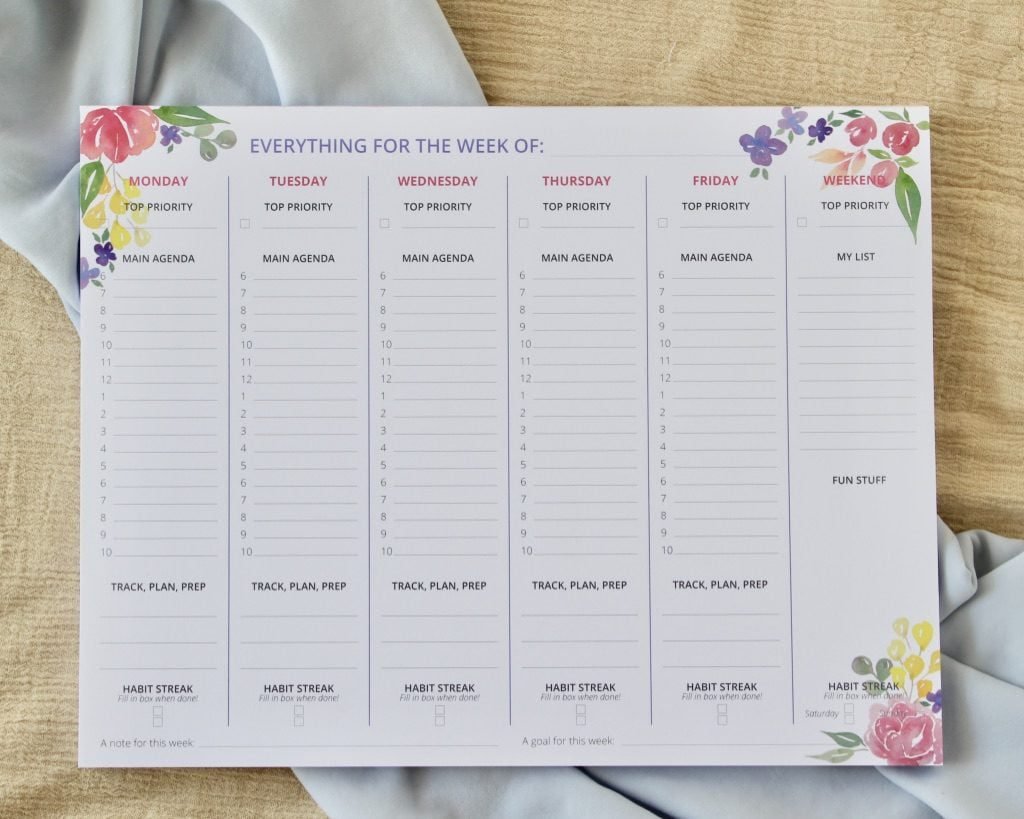Plan Ahead! 10 Ways to Plan For the New Week and Boost Productivity. The Importance Of Planning for the new week.


As the weekend draws to a close, many of us find ourselves facing the inevitable: a new week. Planning ahead can make a significant difference in how smoothly your week unfolds.
10 Ways To Plan For The New Week:
- Reflect on the Previous Week:
Before diving into planning for the upcoming week, take a moment to reflect on the week that just passed. Evaluate what went well, what could have been better, and any lessons learned. This reflection sets the stage for more effective planning. - Set Clear Goals:
Define your objectives for the week. What do you want to accomplish? Whether it’s work-related tasks, personal goals, or a mix of both, having clear goals provides direction and purpose. - Prioritize Tasks:
Once you’ve outlined your goals, prioritize your tasks. Identify the most crucial and time-sensitive activities. This helps you focus on what truly matters and ensures you allocate your time and energy wisely. - Create a Weekly Schedule:
Develop a weekly schedule that includes dedicated time blocks for different activities. Incorporate work commitments, personal obligations, and self-care. A well-organized schedule helps you visualize your week and reduces the likelihood of overlooking important tasks. - Utilize a Planner or Digital Tool:
Choose a planning method that suits your preferences – whether it’s a physical planner or a digital tool. Write down your schedule, tasks, and deadlines. Having a tangible or electronic record keeps you accountable and serves as a quick reference throughout the week. - Meal Planning and Preparation:
Simplify your weekdays by planning and preparing meals in advance. Consider creating a menu for the week, making a shopping list, and even prepping some meals on the weekend. This saves time and ensures you have nutritious options readily available. - Account for Downtime:
Avoid overloading your schedule. Plan for downtime and relaxation to prevent burnout. Whether it’s reading a book, going for a walk, or spending time with loved ones, scheduling moments of rest contributes to a balanced and sustainable week. - Stay Flexible:
While planning is crucial, flexibility is equally important. Unexpected events or new priorities may arise during the week. Leave room in your schedule for adjustments, and be adaptable to change without feeling overwhelmed. - Review and Adjust Midweek:
Midweek, take a moment to review your progress. Assess what you’ve accomplished, what needs adjustment, and if any unforeseen challenges have emerged. This allows you to make necessary tweaks to your plan and finish the week strong. - Mindful Closure on Friday:
As the week concludes, take time on Friday to wrap up loose ends. Complete pending tasks, organize your workspace, and reflect on your achievements. This mindful closure provides a sense of accomplishment and allows you to transition into the weekend with a clearer mindset.
In conclusion, effective planning sets the foundation for a successful and less stressful week. By reflecting, setting goals, prioritizing tasks, and incorporating these practical strategies into your routine, you can enhance productivity and maintain a healthy work-life balance. Start implementing these habits, and watch as your weeks become more organized and fulfilling.

Importance Of Planning For The New Week:

The dawn of a new week brings with it a myriad of possibilities and challenges. It is in the delicate balance between the two that the importance of planning for the upcoming week becomes evident. Far from a mundane chore, weekly planning is a strategic imperative that shapes our days, defines our priorities, and ultimately steers the course of our lives.
**1. *Navigating Complexity with Purpose:*
In a world teeming with distractions and demands, weekly planning serves as a compass. It allows individuals to navigate the complexity of modern life with purpose and intentionality. Without a roadmap for the week, one risks being swept away by the currents of the daily grind, often losing sight of broader objectives.
**2. *Aligning Actions with Goals:*
Goals, whether short-term or long-term, are the lighthouses that guide us through the sea of tasks. Weekly planning bridges the gap between aspirations and reality. It compels individuals to align their actions with their goals, fostering a sense of direction and progress.
**3. *Maximizing Productivity:*
Time, a finite and invaluable resource, demands judicious management. Weekly planning is the cornerstone of effective time utilization. By meticulously allocating time to tasks and responsibilities, individuals maximize productivity, ensuring that each moment contributes meaningfully to their overarching objectives.
**4. *Stress Reduction through Anticipation:*
The unknown can be a breeding ground for stress and anxiety. Weekly planning, however, transforms the ambiguous into the manageable. Anticipating upcoming commitments and challenges allows individuals to approach the week with a sense of preparedness, reducing stress and enhancing mental well-being.
**5. *Fostering Adaptability:*
A well-structured plan is not rigid but adaptable. It acknowledges the inevitability of unforeseen circumstances and provides individuals with a framework for strategic adjustments. In cultivating adaptability, weekly planning equips individuals to navigate uncertainties with resilience and grace.
**6. *Balancing Professional and Personal Life:*
The incessant demands of work often encroach upon personal time, threatening the delicate equilibrium of life. Weekly planning, when done comprehensively, ensures a harmonious balance between professional and personal pursuits. It advocates for the inclusion of self-care and leisure, recognizing the holistic nature of fulfillment.
**7. *Cultivating Reflection and Growth:*
The cyclical nature of weekly planning encourages introspection. Regularly reviewing goals and accomplishments fosters self-awareness and facilitates growth. It becomes a tool for continuous improvement, allowing individuals to refine their strategies and approaches over time.

In conclusion, the importance of planning for the new week extends far beyond the confines of a to-do list. It is a strategic ritual that empowers individuals to chart their course in the turbulent waters of modern life. By aligning actions with goals, maximizing productivity, and fostering adaptability, weekly planning emerges as a catalyst for success and well-being. It is not merely a routine; it is a conscious choice to take charge of one’s time and destiny. As the week unfolds, those armed with a well-thought-out plan find themselves not merely reacting to circumstances but orchestrating a symphony of purpose and achievement.













